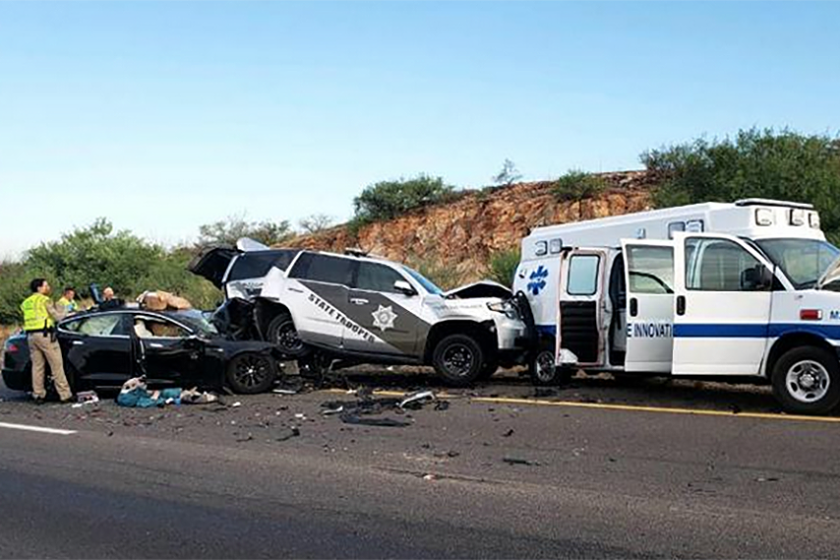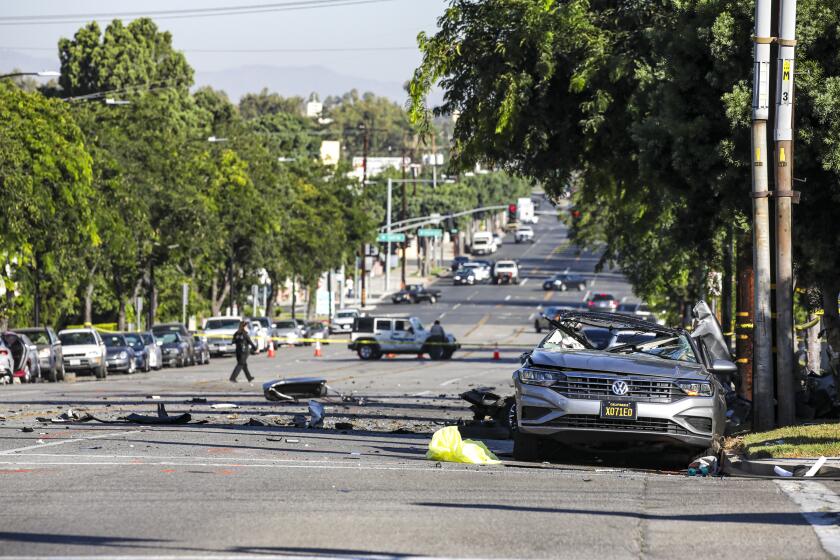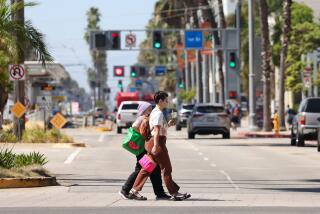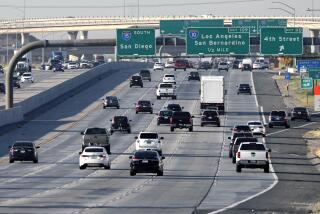Car crash deaths have surged during COVID-19 pandemic. Here’s why

- Share via
It was a tally that shocked the experts: 38,680 deaths on U.S. roadways last year, the most since 2007, even though pandemic precautions had dramatically reduced driving.
“This was completely unprecedented,” said Ken Kolosh, a researcher at the nonprofit National Safety Council. “We didn’t know what was happening.”
One possibility was that stressed-out Americans were releasing their anxieties on the wide-open roads. He guessed that fatal accidents would decline in 2021 when traffic returned.
He was wrong. The latest evidence suggests that after decades of safety gains, the pandemic has made U.S. drivers more reckless — more likely to speed, drink or use drugs and leave their seat belts unbuckled.
“I fear we’ve adopted some really unsafe driving habits, and they’re going to persist,” Kolosh said. “Our roads are less safe than they were pre-pandemic.”
Experts say that this behavior on the road is likely a reflection of widespread feelings of isolation, loneliness and depression.
“We might decide: What does a seat belt or another beer matter, anyway, when we’re in the middle of a pandemic?” said Shannon Frattaroli, a researcher at the Johns Hopkins Bloomberg School of Public Health.
The rise in motor vehicle deaths lines up with other pandemic-era trends: Alcohol sales have soared, drug overdoses have set new records, and homicides have seen their biggest increase on record.
COVID-19 marks “a sea change in psychology,” said Frank Farley, a professor of psychology at Temple University in Philadelphia, who views reckless driving as a form of rebellion — or what he calls “arousal breakout.”
“You’ve been cooped up, locked down, and have restrictions you chafe at,” he said. “So if you can have an arousal breakout, you want to take it.”
Before the pandemic, safety on U.S. roadways had been improving for decades, thanks to enforcement of seat belt laws and the advent of airbags, improved braking and stability control, and other safety features.
While regulators investigate a spate of Teslas steering themselves into parked vehicles, Tesla owners have been reporting faulty collision-avoidance systems.
Even as the number of people on the roads increased and many states raised their speed limits, annual fatalities fell from around 55,000 in 1970 to 36,096 in 2019.
Then came the 7.2% rise in 2020, followed by an 18% jump in the first six months of this year, based on preliminary figures from the federal government.
What made last year’s increase so astonishing was that the total miles driven — an estimate calculated by sampling traffic on various roadways — fell by over 13% as cities locked down and more people worked from home.
For every 100 million miles driven last year, 1.37 people died, a 23% rise from 2019. Mileage estimates are not yet available for 2021.
Scattered across the country at a time when the nation’s attention is on COVID-19 deaths, traffic fatalities have attracted little public notice.
::
Yolanda Bozonier, 59, had just said good night to her grandchildren when a drunk driver slammed into her house in Pomona, killing her in her bed.
Best friends Kimani Foster, 20, and Dior Berkeley, 19, died together in the back seat of a speeding car that smashed into a tree in New York City’s Queens.
Sheria Musyoka, 26, said goodbye to his wife before going out for a morning jog in San Francisco, where he was struck and killed in a crash involving eight vehicles.
::
“We have white crosses marking the sides of the roads, and seeing those is the closest connection that many people will feel to this crisis,” said Paul Ravelin, a State Police patrol commander in Vermont, which saw fatalities jump 32% last year.
Pasadena resident Yang Yang Liu, 33, was struck and killed the day after Thanksgiving by a driver who blew through a stop sign.
Left to probe the statistics, researchers are struggling to attribute the rise in deaths to any one factor.
Fatalities are up in cities and rural areas. They’ve spiked on highways and back roads. They’ve risen during the night and the day, weekdays and weekends. They climbed in every age group between 16 and 65.
They rose in 41 states — with South Dakota, Vermont, Arkansas and Rhode Island experiencing the biggest increases.
Still, some patterns have emerged.
Chief among them is that the death rate for Black people rose more than three times faster than the death rate overall, a disparity that could reflect a deeper sense of despair in the poorer communities hit hardest by the pandemic.
Frattaroli wondered whether it was related to a disproportionate number of Black people in the essential workforce, including delivery drivers who are “paid by how fast you can move.”
In one of the clearest indications of rising recklessness, fatal accidents involving only one vehicle also rose disproportionally.
The data also show an outsize increase in deadly accidents involving speeding, illegal substances or a failure to wear a seat belt.
Jonathan Adkins, executive director of the Governors Highway Safety Assn., a Washington nonprofit representing agencies nationwide, suggested that people’s disregard for themselves and others on the road is part of a national decline in civility that accelerated during the pandemic.
“Anecdotally, we hear from governors’ offices around the country that it’s a symptom and a sign of the overall lack of consideration we’re showing for other citizens, whether it be wearing masks, or not getting vaccinated, or how we drive,” he said. “It’s very aggressive. It’s very selfish.”
In California, which saw a 5% increase in fatalities last year, Highway Patrol officers issued nearly 28,500 tickets for speeds over 100 mph, almost double the 2019 total. They arrested 232 people for reckless driving — a 150% rise — and are on pace to exceed that this year.
Research based on crash investigations has shown that even a slight speed increase — say, from 50 mph to 56 mph — is enough to increase a driver’s risk of death.
Since the start of the pandemic, a larger share of accident victims — including those who survived — have been ejected from their vehicles, typically because they were not wearing seat belts.
The increase in ejections was seen just as lockdowns began last year. Men have accounted for a disproportionate share.
Making the roads even more dangerous is rising drug and alcohol use. In one survey, over 7% of adults said they were more likely to drive while impaired than they were before the pandemic.
Federal researchers who looked at accidents in which drivers were killed or seriously injured found that the proportion who tested positive for opioids nearly doubled after the pandemic began. Marijuana use also rose considerably.
Finally, more drivers are distracted. Researchers used GPS and other data to determine that drivers used their phones more frequently after the pandemic began, and that the problem only worsened over time.
Two teenagers have been arrested and charged in connection with a Burbank street-racing crash that left three people dead and two injured in early August.
As for reducing traffic deaths, there has not been a unified response from authorities.
Arizona, Arkansas and Georgia enacted legislation to crack down on street racing. Texas passed a law against “reckless driving exhibition,” or performing stunts and spinning for a crowd of spectators.
But other states have loosened their driving laws. In Virginia, drivers can now go up to 85 mph — rather than 80 mph — before being charged with reckless driving. Motorists in Maine convicted of criminal negligence that results in a driving-related death now have their licenses suspended for one year instead of three.
And nationwide, more than two dozen traffic safety bills proposed in 2020 and 2021 fell flat.
The deaths continue.
::
Victor Peterzen was riding the bicycle he had just received for his 10th birthday when he was hit and killed by a Jeep in Houston.
Monique Muñoz, 32, died when her car was nearly split in half by another vehicle when its teenage driver barreled through a Los Angeles intersection at more than 100 mph.
Diana Granobles, 31, was driving to JFK airport in New York to pick up her husband when a drunk driver crashed into her car, killing her and their 10-year-old daughter, Isabella.
More to Read
Sign up for Essential California
The most important California stories and recommendations in your inbox every morning.
You may occasionally receive promotional content from the Los Angeles Times.















